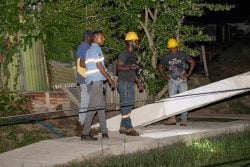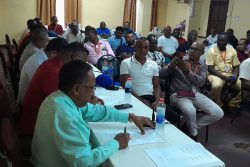As part of its Cancer Month awareness activities, the Ministry of Home Affairs in collaboration with the Ministry of Health and Bhagwans Optical observed annual breast cancer day with a mini-health fair yesterday outside of the Ministry of Home Affairs building on Brickdam.
This partnership was facilitated through several departments of the Ministry of Health including the AIDS/HIV, Food and Nutrition, Counselling, and Optometry departments. The event served to encourage both the public and staff to get breast cancer tests conducted on-site. Dr Shakeila Ramsammy who is attached to the Health Ministry, provided insights into breast cancer. She explained what breast cancer is and the difference between benign and malignant tumors. She also focused on the importance of cell treated examination as a key method for early detection of breast cancer. A volunteer was used to demonstrate the breast examination process, starting from the external part of the breast including, touching and feeling for lumps and checking for abnormal discharge. She noted the importance of knowing one’s normal discharge in order to identify any abnormalities and mentioned the different breast examination positions, including the, “divine position” for larger breasts. She stressed that “both sides of the breast, including the armpit area are to be examined thoroughly.”
She added, “We start from the external part and palpate, meaning touch and feel for lumps, dimpling, changing consistency. We move towards the internal part of the breast to the nipple. So, with the three inner fingers, we palpate in a circular motion from the external part to the internal part. In circular motion, until you reach the nipple. Now these movements must be slow and profound. Not profound to cause discomfort. When reaching the nipple, we squeeze and we look for abnormal discharge. Abnormal discharge would be smelly discharge. Discharge that is yellow, discharge that is green, bloody discharge. Now it is important to know your normal discharge so that you would be able to tell what is normal from abnormal. This cell breast examination could be done in the convenience of your own home. You don’t have to go to a doctor or health care professional. This can be done in the bathroom. It could be done in front of a mirror. And it could be done at the day of the month when you don’t have your period…This could be done in the standing position, the seated position or in the lying position. The lying position will be more beneficial for woman with bigger breast. It helps the breast to spread evenly across the chest. And it allows to feel better for these changes.”
Also discussed were the various risk factors for breast cancer, including lifestyle and genetic predispositions with the surprising disclosure that men can also develop breast cancer. Other types of cancer such as cervical and ovarian cancer are briefly mentioned along with the importance of regular mammograms and ultrasounds for early detection, especially in younger women.
Dr Ramsammy also advised persons to reach out to family members and friends who have been affected by breast cancer to offer emotional support.
Meanwhile, a survivor of breast cancer, Sophia Fredricks, shared her experience about breast cancer. Fredricks began her testimony by acknowledging her ongoing fight against cancer and the importance of support received from loved ones. She talked about her personal experiences and the challenges she faced during her treatment and emphasised the importance of prayer and the support from her loved ones in keeping her spirits high.
Meanwhile, Minister of Home Affairs, Robeson Benn, also shared his personal story about a family member who was battling cancer. He highlighted the emotional and traumatic impact it had on his family while emphasising the increased support and awareness needed particularly for men to ensure they are involved in their own health. He explained that the role of the Ministry of Home Affairs is to provide support and awareness for various health issues including, cancer, and stressed the need for practical support and the importance of seeking help when needed.
The Bhagwans Optical booth showcased various eyewear as well as facilitated eye tests with the voucher of $15,000 that the government provides for persons above 65 years and below18 years to be used toward a pair of glasses.
Dr Shakeila Ramsammy’s booth also issued vouchers for eye tests and the cervical cancer screening for HPV. Also, medical consultation was provided to persons with any medical issues or concerns.
There was also a Ministry of Health booth that gave medical advices on diabetes.





